 TechnoMonk | in
TechnoMonk | in  Aging,
Aging,  Health & Wellness,
Health & Wellness,  Life
Life  Mon, September 5, 2016 at 4:19PM
Mon, September 5, 2016 at 4:19PM I’m doing ok, really I am. I’m moving through life normally: cleaning my apartment, updating my Mac software, posting my daily photo to Instagram, driving to Corvallis to take a walk at OSU. That kind of stuff. Still, there’s this feeling in the background like I could start to cry at any moment.
You see, it was just last Friday afternoon (three days ago) when I was at the dermatologist’s office and it only took about a minute for her to make the call of skin cancer on my nose. “Basal cell carcinoma,” she said, though we’re still waiting on the biopsy results. But it turns out this was likely the good news of the day. Apparently, with surgery, this condition is going to be mostly resolvable.
The bad news was that we biopsied another spot: a small brown thing on the back of my left leg. “Could be melanoma,” she said, rather casually.
 TechnoMonk | in
TechnoMonk | in  Aging,
Aging,  Health & Wellness,
Health & Wellness,  Life
Life  Sun, May 3, 2015 at 11:24AM
Sun, May 3, 2015 at 11:24AM 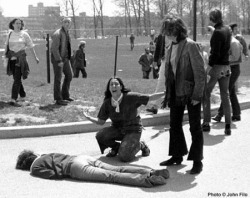 One of the Kent State casualties. Mary Ann Vecchio kneels by the body of Jeffrey Miller in this iconic, Pulitzer-Prize winning photograph by John Filo.Tomorrow is Monday, May 4th, the 45th anniversary of the massacre at Kent State University. The tragedy was a seminal event in American history - a stunning blow to the American psyche as well as to the anti-war movement. Whatever side you were on regarding the question of the Vietnam War (and most people were aligned with one side or the other), if you were alive on Monday, May 4, 1970, you were aware of the events on the Kent State campus that day.
One of the Kent State casualties. Mary Ann Vecchio kneels by the body of Jeffrey Miller in this iconic, Pulitzer-Prize winning photograph by John Filo.Tomorrow is Monday, May 4th, the 45th anniversary of the massacre at Kent State University. The tragedy was a seminal event in American history - a stunning blow to the American psyche as well as to the anti-war movement. Whatever side you were on regarding the question of the Vietnam War (and most people were aligned with one side or the other), if you were alive on Monday, May 4, 1970, you were aware of the events on the Kent State campus that day.
Here is my version of that time and why I write about it now.
On April 30, 1970, President Richard Nixon announced to a national television audience that he was ordering American troops into Cambodia. Although the stated purpose of this so-called “incursion” was to hasten an end to the ongoing slaughter in Vietnam, many Americans, myself included, were thoroughly appalled and believed the act to be an insane expansion of the war effort. Just ten days earlier, in another television address, Nixon had led us all to believe that our involvement in Southeast Asia was winding down in a meaningful way.
May 1970 was the last month of my final semester as an undergraduate student. I was a science major, but I was socially-aware, politically-active and fervently anti-war. My college career had been interrupted when I received a draft notice on June 18,1969. I subsequently spent 22 days in the Air Force during late September and early October of that year – until a chronic knee condition quickly led to a medical discharge. Although by May of 1970 I was no longer at risk of losing my life in this war, I had spent four long years under the specter of the military draft – and the prospect of a gruesome, lonely death in a jungle a million miles away. For myself, and every American male my age, the war was personal. And, like many of my peers, I believed the U.S. intervention in Vietnam to be both illegal and immoral.
President “Tricky Dick” Nixon had been elected, at least in part, on the basis of his “secret plan” to end the war. Yet, here he was, a little over a year into his presidency, ordering an escalation.
From my personal file cabinet. Front page of UW-EC student newspaper “The Spectator” - published May 7, 1970. University President Leonard Haas addresses the Kent State demonstration in the middle of campus. The little red arrow on the left-hand side of the page points to me in the crowd. (Click for enlarged version.)I was pissed. I remember spending the rest of the evening, after watching Nixon’s speech, composing a letter to the editor of my local newspaper. My misssive was not the most eloquent piece of prose ever written, but what I lacked in style, I hope I made up for in passion. This is the last straw. Nixon is wrong. He has to go. The war must end.
Many Americans agreed with me. Unrest on the nation’s campuses, especially, took a dramatic turn. On May 4, 1970, my letter was published in the Eau Claire (WI) Leader-Telegram, the same day that four full-time college students (Allison Krause, Jeffrey Miller, Sandra Scheuer and William Schroeder) at Kent State University were gunned down by Ohio National Guard troops. Another nine students (Joseph Lewis, John Cleary, Thomas Grace, Robbie Stamps, Donald Scott MacKenzie, Alan Canfora, Douglas Wrentmore, James Russell and Dean Kahler) were wounded; one was paralyzed for life, the others seriously maimed.
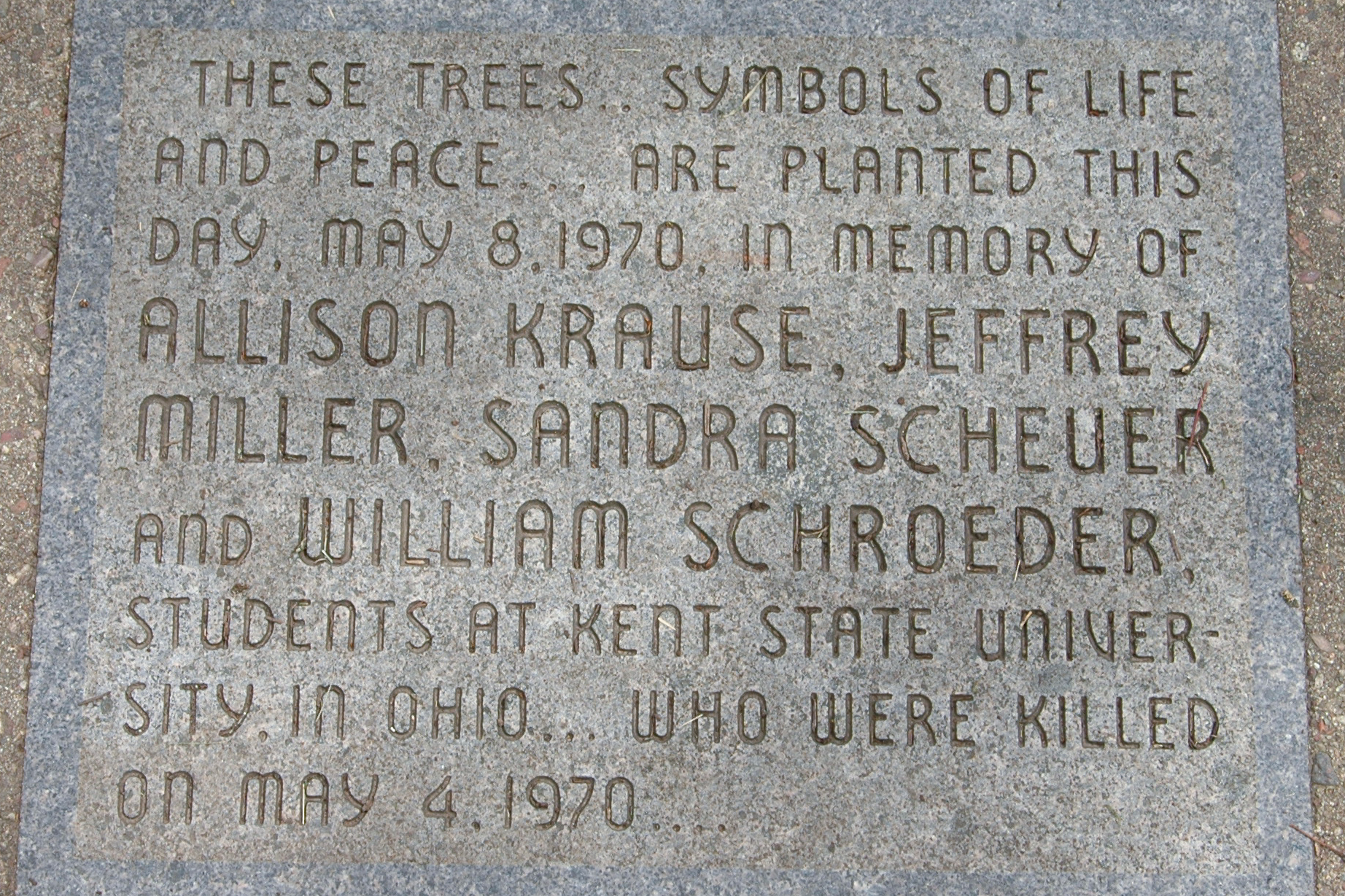 The original Kent State Memorial at UW-EC, dedicated on May 8, 1970. This plaque was removed from its original location in 2010 and presumably now resides in the campus archives. (Photo taken in July 2005. Click for enlarged version.)In the days immediately following Kent State, students at the normally-placid University of Wisconsin - Eau Claire (UW-EC) rallied. This was my campus. I, for one, picketed the Science building and boycotted classes where I had spent the majority of my time studying chemistry and math. On May 6th, a campus-wide demonstration was held, with a group of over 3,000 gathering on the lawn right outside the student union building. (See the accompanying photo, above, as published in the student newspaper the next day.) Two days later, four crab-apple trees were planted, along with a commemorative plaque (see photo to right), in memory of the dead in Ohio. (See also accompanying photo, below, of article published in the May 14th edition of the student paper.)
The original Kent State Memorial at UW-EC, dedicated on May 8, 1970. This plaque was removed from its original location in 2010 and presumably now resides in the campus archives. (Photo taken in July 2005. Click for enlarged version.)In the days immediately following Kent State, students at the normally-placid University of Wisconsin - Eau Claire (UW-EC) rallied. This was my campus. I, for one, picketed the Science building and boycotted classes where I had spent the majority of my time studying chemistry and math. On May 6th, a campus-wide demonstration was held, with a group of over 3,000 gathering on the lawn right outside the student union building. (See the accompanying photo, above, as published in the student newspaper the next day.) Two days later, four crab-apple trees were planted, along with a commemorative plaque (see photo to right), in memory of the dead in Ohio. (See also accompanying photo, below, of article published in the May 14th edition of the student paper.)
In 2010, the Kent State Memorial was removed from the UW-EC campus as part of modernization efforts and the construction of a new student center building. Upon learning of the disappearance of this memorial, I was distressed. For four decades, I had rarely made a visit to the state of Wisconsin that didn’t include some time in meditation sitting among the trees and plaque belonging to the Kent State Four. The institution, without this particular artifact belonging to those turbulent times, somehow seemed incomplete.
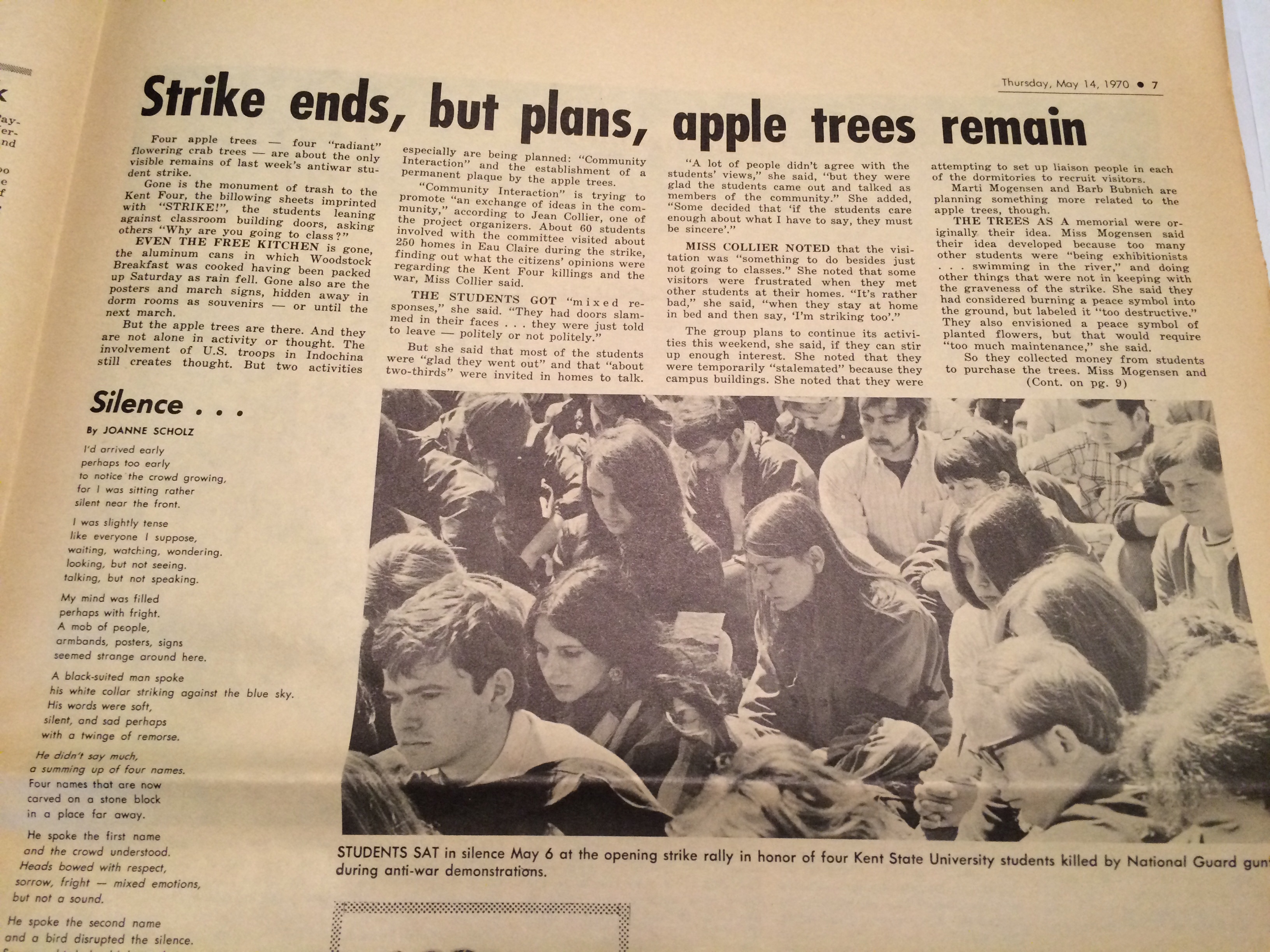 From my personal file cabinet. UW-EC student newspaper “The Spectator” - published May 14, 1970. Continuing coverage of the Kent State demonstrations and the days that followed, including the dedication of a memorial: four crab-apple trees and a plaque planted in the ground by the student center building to forever remember the slain students. That’s me, at age 22, in the top left-center of the photo - taken during the May 6th demonstration. (Click for enlarged version.)TODAY, happily, after enduring five years of uncertainty about the status of the Kent State Memorial, I am here to report a significant new development. I recently received notice (see below) from UW-EC that on May 4th, tomorrow, a new memorial will be dedicated. The old memorial consisted of four crab-apple trees and a plaque. The word is that tomorrow’s event will unveil a memorial also consisting of four crab-apple trees and a plaque (though not the original one pictured above). I am sad that I cannot be there to participate in the event, but very pleased that there will be a new Kent State Memorial to get acquainted with during my next trip to campus.
From my personal file cabinet. UW-EC student newspaper “The Spectator” - published May 14, 1970. Continuing coverage of the Kent State demonstrations and the days that followed, including the dedication of a memorial: four crab-apple trees and a plaque planted in the ground by the student center building to forever remember the slain students. That’s me, at age 22, in the top left-center of the photo - taken during the May 6th demonstration. (Click for enlarged version.)TODAY, happily, after enduring five years of uncertainty about the status of the Kent State Memorial, I am here to report a significant new development. I recently received notice (see below) from UW-EC that on May 4th, tomorrow, a new memorial will be dedicated. The old memorial consisted of four crab-apple trees and a plaque. The word is that tomorrow’s event will unveil a memorial also consisting of four crab-apple trees and a plaque (though not the original one pictured above). I am sad that I cannot be there to participate in the event, but very pleased that there will be a new Kent State Memorial to get acquainted with during my next trip to campus.
A few closing thoughts. The marches, demonstrations and class boycotts in the aftermath of Kent State added up to the most unrest the UW-EC campus had ever seen (or has seen since). And, in sum, when viewed in their historical context, the invasion of Cambodia, the ensuing protests, the massacre at Kent State, and the National Student Strike, were a turning point for the Nixon presidency. To recognize the significance of these events 45 years later, PBS recently (April 28, 2015) debuted a one-hour documentary entitled “The Day the ‘60s Died.” In this film about May 1970, the claim is made that the Kent State killings had a chilling effect on the nation’s anti-war activity. Indeed, it is diffcult to dispute the fact that The Movement was never quite the same. The National Guard was never held accountable. Demonstrations in support of the war became more frequent. The country was more polarized than ever, essentially divided into warring tribes. And it wasn’t until January 27, 1973, that the Paris Peace Accords ending the conflict were finally signed.
Soundtrack Suggestion
Tin soldiers and Nixon coming,
We’re finally on our own.
This summer I hear the drumming,
Four dead in Ohio.
(“Ohio” – Neil Young)
 TechnoMonk | in
TechnoMonk | in  Culture,
Culture,  Education,
Education,  Life,
Life,  Politics,
Politics,  Popular Culture | tagged
Popular Culture | tagged  Kent State,
Kent State,  Student Strike,
Student Strike,  activism,
activism,  anti-war,
anti-war,  memorial,
memorial,  protest
protest  Fri, April 10, 2015 at 1:15PM
Fri, April 10, 2015 at 1:15PM  I received the invitation to my high school class’ 50th reunion last week. How can this be?! It seems like only yesterday I was sitting in our school’s gymnasium, listening to some forgettable speeches, and awaiting my chance to walk the stage.
I received the invitation to my high school class’ 50th reunion last week. How can this be?! It seems like only yesterday I was sitting in our school’s gymnasium, listening to some forgettable speeches, and awaiting my chance to walk the stage.
But, to be sure, it wasn’t yesterday. That event took place in 1965. How time flies.
Aging is the topic on my mind at the moment. And, of course, I’ve been thinking about this for quite awhile now. I attended my first reunion in 1985, having waited a full twenty years before finally getting together with the classmates of my youth. Upon entering that gathering, I remember looking around and saying to myself, “who are all these old people?”
It was at this point that the aging process really grabbed my attention.
So now, here it is 2015, and there are many more signs pointing to the fact that I’m not as young as I once was. I suspect that the things I’m noticing are many of the same ones my contemporaries are dealing with.
Here, in no particular order, are just a few of the markers of time that have caught my attention.
Housing. When I moved to Eugene last summer, I decided to rent a unit in a quiet, peaceful apartment complex that only caters to codgers (male and female) over the age of 55. There are no noisy kids around. And no out-of-control parties. There is a significant population of white-haired folks who use canes, walkers and oxygen tanks, however.
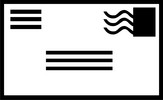 Mail. When I was 49 years old, my junk mail began to have a “retirement” theme – as this is age that AARP identifies you as a mark. And trips to the mailbox only get worse as time goes on. These days, I have lots of information flowing my way about the wide array of Medicare plans and burial options.
Mail. When I was 49 years old, my junk mail began to have a “retirement” theme – as this is age that AARP identifies you as a mark. And trips to the mailbox only get worse as time goes on. These days, I have lots of information flowing my way about the wide array of Medicare plans and burial options.
Diet. The older I get, the more my diet reminds me of medicine. I take numerous dietary supplements, so my daily pill count is way up. And a couple of years ago I bought a NutriBullet machine, so now, as has been the case for 25 consecutive months, I begin my day with a smoothie made of organic, raw fruits and vegetables. But, believe me, it’s not because I’m particularly enamored with the taste of the concoctions I come up with.
Skin. I have these benign brown splotches (I think one term for them is “age spots”) on my body, mostly trunk and scalp. Every so often I have a dermatologist reassure me that they’re not dangerous. I think these things are rather unsightly, but I see them on others my age. There seems to be nothing I can do.
Glasses. I was in the library at Indiana University, reading, in the early 1990s, when the realization hit me: I need bifocals! I made an appointment with the eye doctor, and sure enough, it was my time. Ever since, my eyeglass situation has become more complicated. For over twenty years now, I have worn progressive-lens bifocals for normal use, plus additional pairs for computer-only and reading-only.
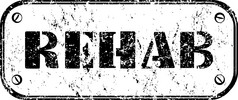 Lifestyle. I live what I call a “rehab” lifestyle. No, I don’t mean working the twelve steps; it’s more a physical therapy kind of existence. Given that my life is, more-or-less, dominated by multiple aches and pains, there is very little time during any given day when that fact is not on my mind. To manage it the best I can, I have sought out practitioners of various therapies for years. You name an approach, conventional or alternative, and it’s likely that I’ve tried it. I’ve had three cortisone injections in my spine in the past three months. In January, I started seeing a local teacher of the “MELT Method” – which has resulted in spending a considerable portion of every morning and evening doing prescribed routines. I walk three or more miles a day. I wear a Thermacare heatwrap around my mid-section almost all the time, and I take a Epsom-salt, hot bath every evening. Every morning I wake up, groan, do my MELT routines before anything else, and start the whole cycle all over again.
Lifestyle. I live what I call a “rehab” lifestyle. No, I don’t mean working the twelve steps; it’s more a physical therapy kind of existence. Given that my life is, more-or-less, dominated by multiple aches and pains, there is very little time during any given day when that fact is not on my mind. To manage it the best I can, I have sought out practitioners of various therapies for years. You name an approach, conventional or alternative, and it’s likely that I’ve tried it. I’ve had three cortisone injections in my spine in the past three months. In January, I started seeing a local teacher of the “MELT Method” – which has resulted in spending a considerable portion of every morning and evening doing prescribed routines. I walk three or more miles a day. I wear a Thermacare heatwrap around my mid-section almost all the time, and I take a Epsom-salt, hot bath every evening. Every morning I wake up, groan, do my MELT routines before anything else, and start the whole cycle all over again.
Reading list. It’s probably no surprise, given the above observations, that the book I’ve most recently read is Being Mortal: Medicine and What Matters in the End. This work very elegantly explores the inadequacy of America’s health system when it comes to end-of-life care.
Well I suspect that’s enough of a list from me for now. I’m sure you have your own.
So, yes, I’m old. But I realize that I should be very grateful. I am living a long, full and interesting life. I got to be a college student in the 1960s. I’ve earned multiple degrees and had the opportunity to work on college campuses most of my life. I don’t rely on narcotics (or illicit substances) for pain management, and have escaped, so far, the trials and tribulations associated with baldness, diabetes, obesity and heart disease. I don’t need to take cholesterol or blood-pressure meds. And, I’ve avoided most mention of tumors. [In 1998, though, during one very long night in an ER, I was diagnosed with bladder cancer. Thankfully, that particular medical opinion, validated at the time by two doctors, turned out to be wrong. (I had a kidney stone.)]
It’s a little over three months until my 50th reunion. The celebration will take place in rural Northern Wisconsin, about two thousand miles from where I now live. I hope the stars are aligned appropriately so that I can make the trip.
Soundtrack Suggestion
No, no, no, no, I don’t do it no more
I’m tired of waking up on the floor
No, thank you, please, it only makes me sneeze
And then it makes it hard to find the door.
[“No No Song” – Ringo Starr]
 Sun, March 22, 2015 at 10:40AM
Sun, March 22, 2015 at 10:40AM Before being nudged, not-so-gently, into retirement, Dr. Teller had spent the last ten years of his academic career as a community-college dean. The final position lasted for seven, interminably-long and difficult years at a junior college in California’s Bay Area.
Teller had come to believe that the life of an academic dean was: Just. Plain. Fucking. Nuts. The most frequent question that coursed through his brain was “why am I here?” Surely this wasn’t an existence that any truly healthy person would take on – other than from a sense of desperation.
The fact was, though: Teller had been desperate. The offer that ultimately came his way emerged after three-plus years of interim positions and a lifestyle of never-ending job-search. When he lost his state-level higher-education post in Oregon, he had been forced to seek out something else to do with his life. When the opportunity arose to be a college dean, he thought, “why not?” And after two temporary gigs in his home state, the California job seemed to provide him some sense of direction, resolution and permanency.
 But while he was quite experienced with, and even amazingly skillful at, managing the highly-political nature of academia, the navigation of community-college campus-level politics turned out to be somewhat akin to living in the “Twilight Zone.” It was as if Rod Serling had come back to provide the script and narration for Teller’s time on this planet.
But while he was quite experienced with, and even amazingly skillful at, managing the highly-political nature of academia, the navigation of community-college campus-level politics turned out to be somewhat akin to living in the “Twilight Zone.” It was as if Rod Serling had come back to provide the script and narration for Teller’s time on this planet.
Of the 112 community colleges in the California community-college system, Teller ended up working at one of the smaller ones. And as it turned out, it had a quite-specific statewide reputation. Not that he knew anything about that when he moved there, of course.
But the reputation was discoverable and, in the end, indisputable: the place was batshit crazy.
To wit:
Still, despite all the evidence in support of its reputation, Teller had not planned on leaving the college when he did. His departure, ultimately, came as a big surprise to him. The interim vice president, who had once been among Teller’s most-trusted allies on campus, had apparently drunk the Kool-Aid too many times. Acting as an agent of the president, she was the one who informed Teller that his time on campus was over.
He was devastated by the betrayal.
When all was said and done, Teller probably should have seen it coming. But he didn’t.
The evidence is there to support the notion that Dr. Teller, himself, had gone native.
In other words: batshit crazy.
 Soundtrack Suggestion
Soundtrack Suggestion
Now and then I think of all the times you screwed me over
But had me believing it was always something that I’d done
And I don’t wanna live that way
Reading into every word you say
You said that you could let it go
And I wouldn’t catch you hung up on somebody that you used to know…
[“Somebody That I Used To Know” – Gotye]
 TechnoMonk | in
TechnoMonk | in  California,
California,  Culture,
Culture,  Education,
Education,  Life,
Life,  Organizations,
Organizations,  Politics,
Politics,  Teller | tagged
Teller | tagged  Job-loss,
Job-loss,  Retirement,
Retirement,  Transition
Transition  Sat, March 14, 2015 at 10:45AM
Sat, March 14, 2015 at 10:45AM As I make an attempt to revive my activity here at Musings, after an extended hiatus, I reproduce below an edited version of a Facebook post I wrote in July of 2014.
------------------------------------------
I should officially announce to y’all that I have made a major transition in my life. After nineteen consecutive years as a higher education administrator (the last ten as a community college dean), I have moved on.
I am retired and have physically relocated from Larkspur, California, to Eugene, Oregon … the place on earth that feels most like “home.” I arrived back here on July 1 (2014).
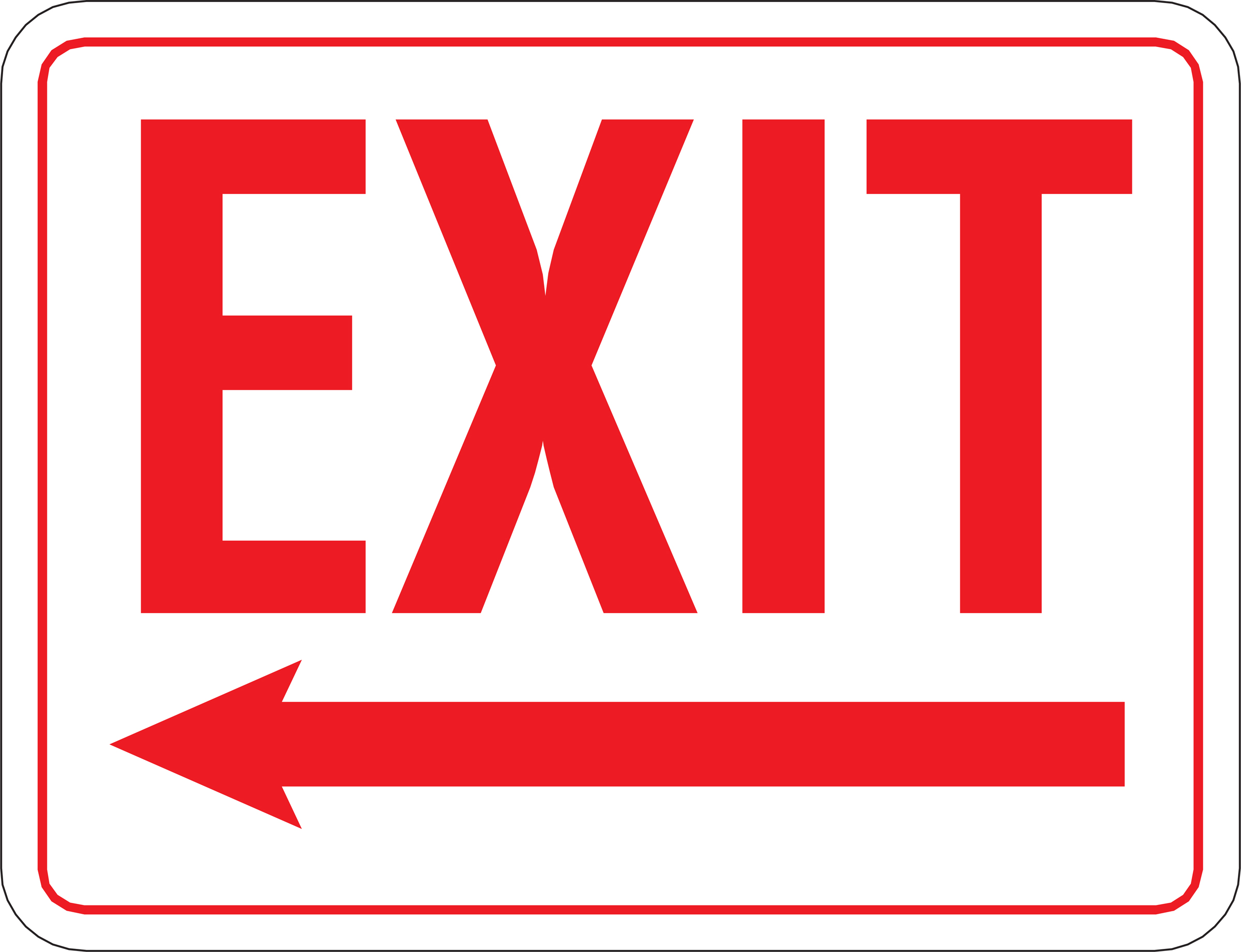 In the spirit of full disclosure, this whole retirement gig was not exactly my idea. (What? Me retire?) It was the path I chose to pursue when my position (Dean of Math & Sciences) at the College of Marin was no longer available to me. The official act dealt with the “non-renewal of my annual contract” … an avenue the president went down with three senior administrators this year. So, I signed up for an early-retirement plan, packed up my shit, and blew that pop stand.
In the spirit of full disclosure, this whole retirement gig was not exactly my idea. (What? Me retire?) It was the path I chose to pursue when my position (Dean of Math & Sciences) at the College of Marin was no longer available to me. The official act dealt with the “non-renewal of my annual contract” … an avenue the president went down with three senior administrators this year. So, I signed up for an early-retirement plan, packed up my shit, and blew that pop stand.
As some of you are aware, I found my role as a community college dean a challenging one. When I left the Oregon University System Chancellor’s Office in 2004 (after a totally politically-motivated reorganization that left many of us devastated), I was warned about the hazards of a dean’s job on a community-college campus. As it turns out, the information I had been provided was frighteningly accurate. At three different community colleges, in two states, over ten years, the storyline was a lot the same: petty campus politics; huge amounts of conflict; rampant dysfunction; and an above-average percentage of mean people. These environments had the effect of deflating my spirit and led me to question the decisions I had made along the way to remain an educator. It all seemed so totally contradictory to the life I thought I had signed up for and, over time, I became increastingly jaded.
However, I survived then, and I’m surviving now. The future is looking brighter and brighter every day, even though I’m still viewing the job-loss experience through the lenses of rejection and betrayal.
 Have you watched, at all, the Netflix original series, “Orange is the New Black”? In the middle of the second season, one of the female correctional officers (Fisher) is fired. When she discloses this to one of the prisoners (Nichols), the response is, “You’re a decent human being. Getting canned from this soul-sucking pit is the best thing that ever happened to you. Go home, take a hot bath …”
Have you watched, at all, the Netflix original series, “Orange is the New Black”? In the middle of the second season, one of the female correctional officers (Fisher) is fired. When she discloses this to one of the prisoners (Nichols), the response is, “You’re a decent human being. Getting canned from this soul-sucking pit is the best thing that ever happened to you. Go home, take a hot bath …”
OK. Right now, I’m officially in the “hot bath” stage.
Soundtrack Suggestion
Somewhere, somehow somebody
Must have kicked you around some
Tell me why you wanna lay there
And revel in your abandon
Listen it don’t make no difference to me baby
Everybody’s had to fight to be free
You see you don’t have to live like a refugee
Now baby you don’t have to live like a refugee
 TechnoMonk | in
TechnoMonk | in  California,
California,  Education,
Education,  Life,
Life,  Oregon,
Oregon,  Personal Growth,
Personal Growth,  Philosophy,
Philosophy,  Work | tagged
Work | tagged  Relocation,
Relocation,  Retirement
Retirement